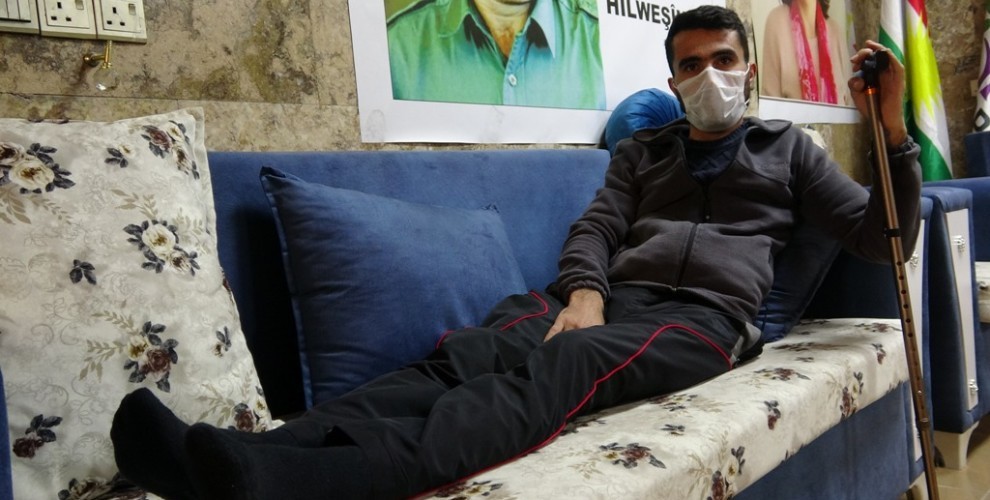Hunger striker Yağız on day 113 of fast
“This action will be successful. I will try to realize my dreams. I will try to heal the wounds of this people. My hope is strong.”
“This action will be successful. I will try to realize my dreams. I will try to heal the wounds of this people. My hope is strong.”

Nasır Yağız has been on an indefinite hunger strike since 21 November. He is the HDP representative in Hewlêr and has followed HDP Hakkari MP Leyla Güven’s action demanding the end of isolation against Kurdish People's Leader Abdullah Öcalan.
Yağız has reached day 113 of his fast and his condition is worsening. On 26 February, when he was on day 98 of his fast, he was taken to Par Hospital and after being checked by doctors he refused treatment and continued the hunger strike.
Every time we visit Yağız, we discover a different feature. On our last visit, we found Yağız in bed listening to Muradê Kinê reading the story of Eliyê Memed and Seyranê who lived in the villages of Hesen and Heyderan. After listening to this love story we began to chat with Yağız.
I am fasting to live a free life with Leader Apo
Yağız said that his biggest dream was the freedom of Kurdish People's Leader Abdullah Öcalan and to live a free life with him. “President Apo's reality and life enabled me to pursue my dreams by strengthening me even more. This fast is to live a free life with Leader Apo.”
I would like to film the epic of Eliyê Memed and Seyrê
In the conversation, we learn about the interest in art and theater Yağız has. He says that his second dream is to make a film about the epic of Eliyê Memed and Seyrê.
“I have been interested in theater and culture since I was a child. - he said - I grew up in such an environment. My grandparents were telling us Kurdish legends. In the village the dengbejs had their own circle and were singing these legends and stories. The one that struck me most was Miradê Kinê. The voice of the dengbej was always in my ears.
After a while I was more interested in theater. I tried to make a documentary with the stories and epics that had listened while growing up in the context of the natural society and village life.
When we evaluate the current state of societies, we see that the forces of power always try to move society away from its culture. The Turkish state is attacking the cultural and social values of the Kurdish people with the same logic. When I worked with theater, I wanted to turn into films and documentaries the Kurdish stories, epics and poems I heard.”
When asked why this epic is so special, Yağız said: “The story of Eliye memed and Seyre, told by Mirade Kine, happened in our region near our village. Kercews lived in Kerboran and the mountains around us, as well as in Misirce. Eliye Memed is a relative of the village lords, Hesen and Heydara. After his father died, he started to work for the lord and serve him.
The lord of Hesne and Heyderan has 3 siblings, and one of them is Qolqasim. Qolqasim loves his sister and takes care of her. One day, Seyre sees Eliye Memed and falls in love. A while later, Seyre tells Eliye Mirade that they want to get married, but Eliye Memed doesn’t approve because he looks poor. Seyre then takes Eliye Mirada and they go to the Iskane Gulixane village together as guests to Iskane Gulixane in Kela Cumani between Mawa and Misric. There, Iskane Gulixane betrays Eliye Memed to take Seyre for himself and kills him with a dagger. Seyre wanders the mountains after that. Anyways, if anybody is curious this story of true love can be found.
This epic is a reflection of Kurdish love, betrayal and society. Seyre and Eliye Memed remain in love until they die. This is something that moved me greatly.”
In this epic, the reality of Kurdish love is reflected in the betrayal and the situation of the society in the region. At the same time, Seyrê and Eliyê Memed remain loving each other until they die. This has affected me a lot."
Art is a mirror of society
Yağız, drawing attention to the art and the artist, said: “Art is a mirror held by society. When art sheds light on society, it reaches its own reality. The enemy saw the reality of this Kurdish culture, this richness and therefore attacked Kurdish art and culture. Especially they wanted to destroy our history. For this reason, we need to value our art and culture.
I hope artists, dengbêjs and cultural workers focus on social reality. If there is no social reality, art and works of art will not appear. As the dengbêjs see this reality, new songs emerge. This is the history we come from. The dengbêjs transmitted many historical events to their present day.
Yağız ended his remarks by saying: “This action will be successful. I will try to realize my dreams. I will try to heal the wounds of this people. My hope is strong.”